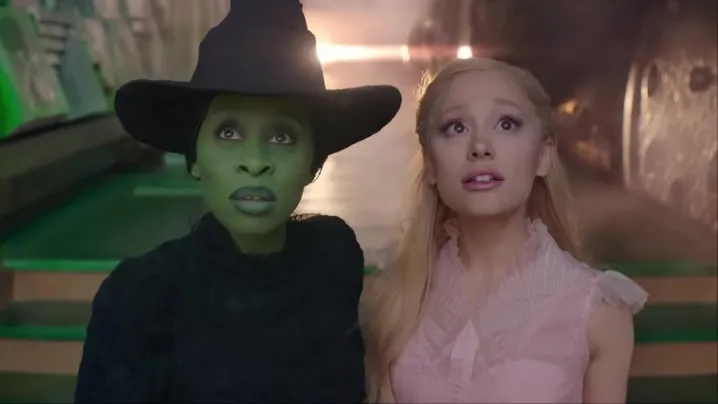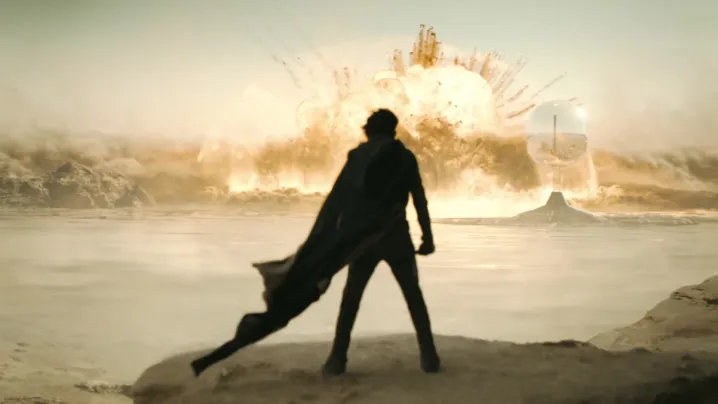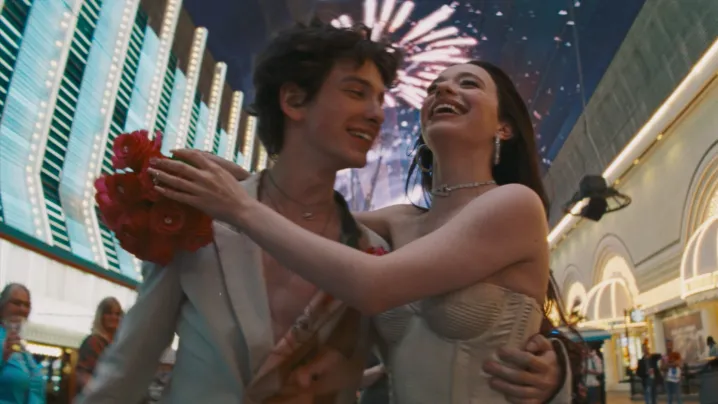Los Angeles smolders, but the show must go on, apparently. Delaying no further, the Academy yesterday announced the nominees for the 2025 Oscars — one year to the day from the last time they unveiled the contenders in every category. No Barbenheimer looming over our new Oscar season, try though entertainment journalists and social media users did to manufacture a sequel to that double-feature moviegoing event for the ages. This week’s nominations narrowed a crowded race without pointing towards a certain winner. The Best Picture lineup was tougher to predict than last year’s, which conformed so entirely to the expectation that the 2024 version of this very article could be written entirely in advance.
Easier than identifying the frontrunner for this year’s Oscar is picking a favorite. Perhaps even more so than usual, Best Picture runs the gamut from worthy to decidedly not. The best of the nominees was truly the best movie of the year. The worst would make for a historically blunderous end to the 97th Academy Awards. In between, we’ve got blockbusters not half as good as the big winner of 2024, Oppenheimer; a better-than-average example of a generally lukewarm genre, the musical biopic; and a staggeringly ambitious budget epic whose reach exceeds its grasp (but hey, the reach is admirable all the same).
Of course, the hierarchy of preference below is as subjective as the ranked ballots Academy members will soon fill out to determine a winner. It’s all just one movie lover’s opinion. Yes, even the last-place selection, though this writer may be howling a different, less reasonable tune should that disaster pull out the victory.
10. Emilia Pérez (2024)
 Selena Gomez in Emilia Pérez Shanna Besson / Why Not Productions
Selena Gomez in Emilia Pérez Shanna Besson / Why Not ProductionsEvery Oscar season has its villains, but they’re rarely as downright hissable as Jacques Audiard’s musical melodrama about a conflicted lawyer who helps a transgender cartel boss shed her old identity and life. It’s tough to say what’s most tasteless about this odious Netflix soap opera: the tacky songs (“from penis to vagina”), the trivializing depiction of Mexico’s drug war, or the way the French director plays right into paranoid right-wing fantasies by following a character who transitions partially just to skirt accountability for her crimes. Never mind that Emilia Pérez takes her #GirlBoss baptism at face value, as though changing her gender really does absolve Emilia of all sins she committed before the surgery. Only on grounds of sheer audacity can one praise a genre-bending folly that lives down to the Mrs. Doubtfire comparisons it’s earned. Were it to win, it would be the worst Best Picture since Crash, another act of bogus allyship.
9. Wicked (2024)
 Cynthia Erivo and Arianda Grande in Wicked Universal Pictures / Universal Pictures
Cynthia Erivo and Arianda Grande in Wicked Universal Pictures / Universal PicturesOne year after Barbenheimer, voters looking to honor a comparably, ahem, popular phenomenon will have to settle for the first act of a Wizard of Oz origin story that took Broadway by storm a couple of decades ago. Wicked is a much better musical than Emilia Pérez (though not necessarily the best musical nominated, depending on how you classify a rock-star biopic that ambles from one full-song performance to another). But it has plenty of its own glaring issues, from that uneven songbook — they’re not all earworms of “Defying Gravity” caliber — to the unsightly, blinding backlight that mars too much of director Jon M. Chu’s digitally processed imagery. Cynthia Erivo and Ariana Grande’s endearing performances as mismatched magic-school roomies carry us over the bumpier stretches, but they can’t banish the sense of incompletion that comes from greedily cleaving a complete story in two. Would you give the Tony to a show that stopped at intermission?
8. Conclave (2024)
 Focus Features
Focus FeaturesHammy papal theater aimed at the cheap pews and the senior-discount crowd. There’s wonkish appeal to the behind-closed-doors matter of selecting a new pope, but screenwriter Peter Straughan (working from the Robert Harris novel) forgoes the bureaucratic nitty-gritty in favor of juicy melodrama, portraying the Vatican as a hotbed of grandstanding, backstabbing, and salacious gossip. Conclave is the loud version of a quiet movie, featuring lots of fussy “subtlety” by the likes of Ralph Fiennes, Stanley Tucci, John Lithgow, and Isabella Rossellini (in a glorified mic-drop cameo calibrated to light up an invisible You Go Girl applause sign). And it’s staged like an action flick, all booming and swelling music, all figurative fireworks interrupted by literal explosions en route to a profoundly silly final twist. To paraphrase Logan Roy, this is not serious cinema… which is one reason it just might win. The Academy loves a middlebrow crowd-pleaser with the veneer of importance and a Sorkinish belief in the power of a convincing speech.
7. Dune: Part: Two (2024)
 Timothée Chalamet in Dune: Part Two Warner Bros. / Warner Bros.
Timothée Chalamet in Dune: Part Two Warner Bros. / Warner Bros.The best adaptation of Dune is still… Dune. Which is to say, while Denis Villeneuve has made a ravishing IMAX spectacle from Frank Herbert’s 1965 cult novel, he hasn’t necessarily found a story or characters worth caring much about in that dense dossier of mythology, exposition, and desert-dry feudal intrigue. The second installment of his two-part epic is more fun than the first, by virtue of pushing past the table setting of this messiah saga and getting to the sandworm rodeo and the jihad and those rumbling war machines out in the sandy wilds of Arrakis. But even stretched to fit the biggest screen available, Dune remains a rather remote space opera; it dazzles the eyes and rattles the bones without quite stirring the soul as the most transporting science fiction does.
6. A Complete Unknown (2024)
 Timothée Chalamet in A Complete Unknown Searchlight Pictures / Searchlight Pictures
Timothée Chalamet in A Complete Unknown Searchlight Pictures / Searchlight PicturesNo, it’s not the definitive Bob Dylan biopic. That was the one that cast a half-dozen actors in the role to make the point that there’s no pinning down rock-’n’-roll’s slippery poet laureate. A Complete Unknown is more conventional, conforming an eventful early stretch of Dylan’s life and career to the bullet-point storytelling director James Mangold favored in his earlier Walk the Line. All the same, this is a pretty entertaining Wikipedia skim, thanks to Timothee Chalamet’s refined, croaking impression and to Mangold’s fluid pacing — the way he keeps the movie moving along, years passing in a jukebox blur of gigs, rehearsals, and jam sessions. If the film doesn’t quite rise above the level of a love letter, it’s because it fails to properly trace the fallout at the center of its narrative: the dissolution of the relationship between folk music’s next great hope and Edward Norton’s idealistic scene elder.
5. I’m Still Here (2024)
 Fernanda Torres in I’m Still Here Sony Pictures Releasing / Sony Pictures Releasing
Fernanda Torres in I’m Still Here Sony Pictures Releasing / Sony Pictures ReleasingA nomination almost no one saw coming, probably because so few have seen the film. But it’s not an unwelcome surprise that Walter Salles (The Motorcycle Diaries) cracked the Oscar top 10 with this wrenching true story of a Brazilian ex-congressman who disappeared by his country’s military in 1970. The first half, in which signs of encroaching danger intrude upon the family’s domestic bliss — eventually giving way to a harrowing crucible once the threat arrives at its doorstep — is much more gripping than the subsequent limbo state of grief and uncertainty from which the film never emerges. But how else should one feel deflated by a drama seeking to capture the nightmare of indefinitely waiting for awful news? Golden Globe winner Fernanda Torres, who scored a deserved Best Actress nomination for her performance as the victim’s resilient wife, makes her agony ours. By the end, we’re as starved for closure and catharsis as she is — and maybe edified by some timely insight into what it means to survive the fascism rapidly consuming your homeland.
4. Nickel Boys (2024)
 Amazon MGM Studios / Amazon MGM Studios
Amazon MGM Studios / Amazon MGM StudiosThe precedent of Nickel Boys has been perhaps overstated: This is not the first movie to unfold entirely from the first-person POV of its protagonist. The innovation lies more in the intention behind that formal gambit. RaMell Ross, a documentarian making an auspicious maiden leap into narrative, uses the subjectivity of the camerawork to bridge the emotional gap between the viewer and the young, Black subjects of Colson Whitehead’s novel, swallowed whole by a reform school that stole their childhoods, their voices, and their futures. In that respect, you could say Ross has adopted a visual language of empathy while offering some of the most breathtaking images of the year in the film — a rush of snapshot memories that transform the camera into both eyes and mind’s eye. There are moments when Nickel Boys feels hemmed in by its bold shooting strategy; it sometimes really limits the actors, forced to deliver their dialogue off camera or straight into the lens. But the moral dimension of its assembly cannot be denied.
3. The Brutalist (2024)
 Adrien Brody and Guy Pearce in The Brutalist A24 / A24
Adrien Brody and Guy Pearce in The Brutalist A24 / A24So transparently has Brady Corbet aspired to make the Great American Movie that you can’t help but tally the ways that he hasn’t. The most prominent misgivings arise on the other side of a runtime-splitting intermission, when Felicity Jones enters this three-and-a-half-hour VistaVision epic as a wearied Holocaust survivor and another character commits a shocking violation that makes allegorical sense but feels suspiciously like a Hail Mary in lieu of an organic resolution to the film’s conflict between artistic values and the fickle whims of investors. Still, what a swing! The Brutalist certainly grazes greatness, thanks to the entwined, powerhouse performances of Adrien Brody and Guy Pearce — embodying that aforementioned conflict so vividly and idiosyncratically — and to the ambitious grandeur of its design, apropos for the tale of a genius architect unwilling to compromise his vision. If nothing else, no movie this year more memorably bookended itself, beginning with a disturbingly relevant symbol of America’s false promise and ending on a note of troubling ambiguity and ambivalence disguised as triumph.
2. The Substance (2024)
 Mubi
MubiCoralie Fargeat must have really touched a nerve (or ripped it straight out), because how else can you explain such an appalling, literal bloodbath getting invited to the ball? The French director’s satirical orgy of body-horror atrocities has to be the flat-out grossest movie ever nominated for Best Picture — and unlike, say, Saving Private Ryan, it plays its splintering limbs and arterial spray for lunatic laughter.Hollywood may be hopelessly superficial, but the industry seems to have looked past the slick, slicked surfaces of this gloriously repulsive movie, finding the beating heart beneath the oozing flesh in Demi Moore’s fearless, relatable performance as a star chemically reborn. What a hoot it would be to see it win, though our own ventricles pound and throb just a little more passionately for another contender.
1. Anora (2024)
 Neon / Neon
Neon / NeonSean Baker’s uproarious tragicomedy entered awards season as the presumed Best Picture frontrunner. It now seems in danger of going home empty-handed on Oscar night. That’s actually kind of fitting for a portrait of a rude awakening – a Cinderella story that goes spectacularly off the rails into a wild goose chase across Brooklyn. But it’s also a damn shame because Anora earns that slipper. Baker threads so many needles with his screwball neorealism, emerging with a relentlessly entertaining farce (at least four performances in this movie that could and maybe should have vied for Supporting Actor) that crumbles into heartbreak, the laughs catching in your throat. And if you wanted a mirror of the disappointment, economic despair, and oligarchic injustice of 2024, you could find it in the year’s best movie. Anora, like the Brighton Beach exotic dancer Mikey Madison so vibrantly portrays, deserves it all. Time will be kind to the film, even if the Academy isn’t.
The 97th Academy Awards air on ABC and stream live on Hulu on March 2. For more of A.A. Dowd’s writing, visit his Authory page.
Check out this guide for 2025 Best Picture Oscar streaming information.




















 English (US) ·
English (US) ·